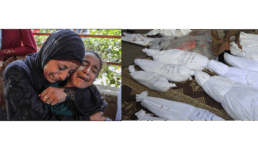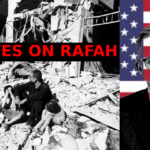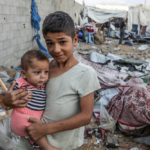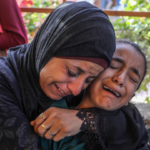What is the Legal Definition of Genocide?

On 16 September 2025, the United Nations Independent International Commission of Inquiry on Palestine (the Genocide Commission) released a 72-page report which found that Israel’s conduct towards Palestinians in the Gaza Strip fulfils the definition of genocide in international law.
The finding is consistent with a resolution passed on 28 July 2025 by the world’s leading authority on the law of genocide, the International Association of Genocide Scholars, as well as with findings by several other leading organisations including Amnesty International, European Center for Constitutional and Human Rights, United States Center for Consitutional Rights, Human Rights Watch, International Federation for Human Rights, Médecins Sans Frontières (Doctors Without Borders), Israeli Information Center for Human Rights in the Occupied Territories (B’Tselem), The International Court of Justice (the ICJ, whose investigation is ongoing) as well as several nations – 14 of which have formally backed South Africa’s genocide case in the ICJ – and over 800 leading academics, many of whom are Israeli Jews.
But what is the legal definition of genocide in international law? How does Israel’s conduct fulfil this definition? And what legal consequences flow from the UN’s finding?
The Genocide Convention
The legal definition of genocide in international law is contained in Article II of the Convention on the Prevention and Punishment of Genocide 1948 (Genocide Convention) which states:
“In the present Convention, genocide means any of the following acts committed with the intent to destroy, in whole or in part, a national, ethnical, racial or religious group, as such:
- Killing members of the group;
- Causing serious bodily harm to members of the group;
- Deliberately inflicting on the group conditions of life calculated to bring about its physical destruction in whole or in part;
- Imposing measures intended to prevent births within the group;
- Forcibly transferring children of the group to another group.”
The definition contains two specific elements:
- A mental element, which is the intent to partly or wholly destroy a national ethnical, racial or religious group, and
- A physical element, which is any one or more of the give listed acts.
Article I of the Convention makes clear that genocide may take place in the context of an armed conflict – whether international or domestic – as well as during times of peace.
The Convention came into effect on 12 January 1951 and has been adopted by 153 nations, including Australia which signed the Convention on 11 December 1948 and ratified it on 8 July 1949.
Australia created five specific genocide offence in 2002, which are contained in Division 268 of the Criminal Code Act 1995 (Cth). These are:
- Genocide by killing, section 268.3,
- Genocide by causing serious harm, section 268.4,
- Genocide by inflicting destructive life conditions, section 268.5,
- Genocide by preventing births, section 268.6, and
- Genocide by forcibly transferring children, section 268.7.
Each of these offences carry a maximum penalty of life in prison.
The Genocide Commission’s finding
Following a nearly two-year long investigation which reviewed thousands of documents including officially released materials, hundreds of reports including those from Israeli Defence Force soldiers, medical practitioners, aid organisations and various other frontline personnel, and dozens of publications including statements from Israeli agencies and officials, as well as various broadcasts including frontline footage, the Genocide Commission concluded that:
“Israeli authorities and Israeli security forces committed four of the five genocidal acts defined by the 1948 Convention on the Prevention and Punishment of the Crime of Genocide, namely killing, causing serious bodily or mental harm, deliberately inflicting conditions of life calculated to bring about the destruction of the Palestinians in whole or in part, and imposing measures intended to prevent births.
Explicit statements by Israeli civilian and military authorities and the pattern of conduct of the Israeli security forces indicate that the genocidal acts were committed with intent to destroy, in whole or in part, Palestinians in the Gaza Strip as a group.”
It Commission’s chairperson, Navi Pillay, went on to state:
“It is clear that there is an intent to destroy the Palestinians in Gaza through acts that meet the criteria set forth in the Genocide Convention.”
“The responsibility for these atrocity crimes lies with Israeli authorities at the highest echelons who have orchestrated a genocidal campaign for almost two years now with the specific intent to destroy the Palestinian group in Gaza.
The Commission also finds that Israel has failed to prevent and punish the commission of genocide, through failure to investigate genocidal acts and to prosecute alleged perpetrators.”
Some of the Commission’s key findings in reaching its conclusion include Israel’s deliberate targeting of children through a range of means including shooting and starvation, systematic acts of sexual violence against women, deliberate killing of civilians in areas designated by Israeli authorities as safe zones, deliberate targeting of critical infrastructure including the destruction of more than 90% of hospitals and schools, systemic blocking of aid – including water, food and medicine – leading to a situation of famine and widespread disease and avoidable death, and deliberate targeting of healthcare workers including doctors, nurses and support staff, as well as journalists reporting on the situation.
The Commission found that both public and private pronouncements by key members of the Israeli government as well as authorities and personnel of the Israeli Defence Force and others are evidence of a clear and systemic intent through the described and other actions to not ‘only’ ethnically cleanse Gaza of Palestinians, but to destroy Palestinian people in whole or in part, thereby satisfying the intent requirement of genocide.
The legal consequences that flow
The UN’s formal finding of genocide creates legal obligations for all signatories to the Genocide Convention, including Australia, the United States, the United Kingdom and indeed Israel itself.
Namely, the Convention creates the following obligations:
- Not to commit genocide (Article I as interpreted by the ICJ)
- To prevent genocide (Article I) which, according to the ICJ, has an extraterritorial scope;
- To punish genocide (Article I);
- To enact the necessary legislation to give effect to the provisions of the Convention (Article V);
- To ensure that effective penalties are provided for persons found guilty of criminal conduct according to the Convention (Article V);
- To try persons charged with genocide in a competent tribunal of the State in the territory of which the act was committed, or by an international penal tribunal with accepted jurisdiction (Article VI);
- To grant extradition when genocide charges are involved, in accordance with laws and treaties in force (Article VII).
And while the specific actions required to prevent and punish genocide are not made clear, they have in the past included strict sanctions, the deployment of peace keeping personnel and direct military intervention, as occurred in Rwanda in 1994 and Boznia and Herzegovina in 1995.
It must be said that, in the case of Israel, there are significant political and economic impediments to such actions being taken. Israel is a nuclear power that boasts a formidable defence force and intelligence network, and wields significant political and economic influence across many nations.
The United States is a strong political supporter of the Israeli state, supplying it with much of the arms used in the actions taken against Palestinians, and US political leaders and parties receive significant funding from Israeli lobbyist groups. The government of Israel has been steadfast in its refusal to allow foreign journalists and observers to enter and report on what has been occurring, going so far as to kill over 200 journalists who were already there, many in targeting attacks. It certainly do all it can to resist attempts by foreign nations to intervene.
Australia is also a political, economic and military supporter of Israel – currently supplying the nation with F-35 airplane parts used in the fighters deployed against Palestinians; although our nation has in recent times indicated support for recognising the Palestinian state and issued statements condemning two Israeli ministers – Itamar Ben-Gvir and Bezalal Smotrich – for “incit[ing] extremist violence and serious abuses of Palestinian human rates” including calling for Gaza to be “ethnically cleansed” of Palestinians.
It is a complicated situation, but the finding of Committee’s finding of genocide makes clear that signatories to the Genocide Convention are legally required to take action against the genocide in Gaza, or risk being found complicit in, or even supportive, of the atrocities taking place.






